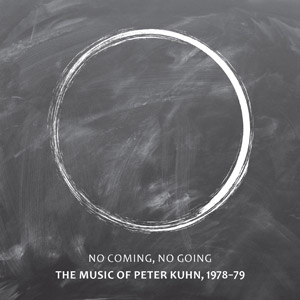Peter Kuhn
The Other Shore (No Business, 2016)
No Coming, No Going: The Music of Peter Kuhn, 1978-79 (No Business Records, 2016)
Reprieves aren’t too common in the jazz business. For every rediscovered figure who narrowly lost battles with personal demons, like bassist Henry Grimes or reedists Giuseppe Logan and Frank Morgan, there are countless others who weren’t able to get things together enough to survive, much less perform and record with newfound verve. The indifference with which creativity is often met in America certainly doesn’t help matters — the baring of one’s soul and reaping few financial or psychic rewards is a lot to take for even the most committed and strong-willed. Clarinetist and saxophonist Peter Kuhn took a chance relocating to New York from his native California in 1977, encouraged by Anthony Braxton, and soon began playing and recording with figures like bassist William Parker, violinist Billy Bang, saxophonists Frank Lowe and Dave Sewelson, and leading his own ensembles for Soul Note, Hat Hut, and his own Big City Records. Unfortunately, Kuhn had a massive heroin habit that, coupled with an already hand-to-mouth existence in the Lower East Side, precipitated a return to California in 1981 — causing him to subsequently leave music and suffer periods of incarceration and homelessness. Kuhn was able to kick it and has remained sober since 1986, though resultant health issues have presented their own serious challenges.
Though his few leader dates are as obscure as they are remarkable, a return to — or perhaps exceeding of — form in 2016 with a new trio is just about the last thing one would expect. The Other Shore presents eight original pieces across nearly eighty minutes on which Kuhn’s clarinet, bass clarinet, alto and tenor saxophone are joined by percussionist Nathan Hubbard and bassist Kyle Motl. Certainly age and experience bring a subdued depth to Kuhn’s phrasing, a gravel taffy that worries into laconic phrases and congeals in bright upward bursts. On bass clarinet he espouses a particularly thick, round warble, providing a calm and lean force to the opening “Is Love Enough,” echoes of “Lonely Woman” appearing as Kuhn switches to Bb against grumbling pizzicato and the brushy shimmer of Hubbard’s kit. Though saxophones were not his primary instruments on earlier recordings, there’s ample space here for his taut pillows to emerge alongside thrumming rhythms on “Unstrung Heroes,” an achy clamber that narrows into pirouettes before easing again toward a wide furrow.
It’s not hard, after listening to a number of cuts, to hear Kuhn’s personality across four horns — spry tears and chatter given to flying charges on alto translates to alternating passages of methodical and ebullient conversation scraps on clarinets and tenor, the former occasionally drawn into echoes of Perry Robinson, an influence and supporter from Kuhn’s early years. Mention should be made, once again, of the rhythm section — Motl’s snappy circularity and charged arco offer a yawing undercurrent as Hubbard is precise, swinging and clamorous. Kuhn’s reemergence is not only in good company, but a joy to behold.
Dialing back the clock nearly 38 years to his emergence on the New York free music scene, Livin’ Right was Kuhn’s debut as a leader, culled from recordings made for WKCR-FM on December 19, 1978 with William Parker, drummer Denis Charles, and trumpeters Arthur Williams and Toshinori Kondo (doubling on alto horn). The program was split into two halves featuring Kuhn’s pieces and a lengthy suite by Williams; the latter didn’t see release until this year, appearing as Forgiveness Suite (NoBusiness NBLP 97). Shortly after, an augmented version of this band would record one composition that was later included on Parker’s Through Acceptance of the Mystery Peace LP (Centering 1001). Livin’ Right was the only LP on Kuhn’s Big City Records imprint, its jacket front emblazoned with a Huichol yarn painting; for this CD reissue titled No Coming, No Going it’s presented in recorded sequence with the added bonus of a second CD featuring duets with Charles recorded in the fall of 1979. Following the blistering, red-lined bounce of “Chi,” which quickly asserts itself as a vehicle for the drummer’s watery, Blackwellian invention, the centerpiece of the disc is a thirty-minute performance of “Manteca/Long Gone/Axistential” which begins yo-yoing with tempo, Kuhn’s curly, voluminous brays in dialogue with chewy muted trumpet barbs and Kondo’s alto horn whines atop pulsative waves before shifting into the event-oriented processional of “Long Gone,” the clarinetist’s uninterrupted mid-register swaths rendered with unsettling detail. Williams and Kondo are both extraordinary here, their husky microbursts in diffuse, somber clarity amid gradually unfolding ballads and puckering loose swing.
The duos with Charles were recorded just under a year later at the New England Repertory Theatre and add Kuhn’s tenor to the palette. The opening “Stigma” is a floppy tune reminiscent of Steve Lacy or Jemeel Moondoc (especially given their shared percussionist) that spreads out into a beastly clarinet solo and Charles’ vibrant, talkative responses. Bookended by gnarled tenor squawks, “Drum Dharma” settles into concentric drum swells, crackling rim shots and coiled, grunting fireworks aside Kuhn’s woody latticework and projected shimmy, while the closing “Headed Home” is a rousing, crisp dialogue between the drummer’s supple constant motion and crisp, velvety saxophone bursts gleefully possessed. Even if he had to depart for an extended period, Peter Kuhn left a serious mark on the free music underground.
–Clifford Allen, August 15, 2016

